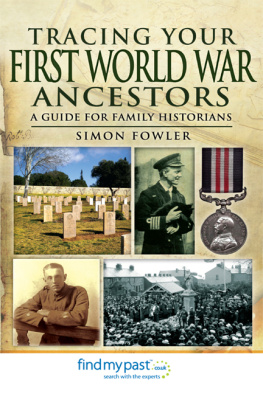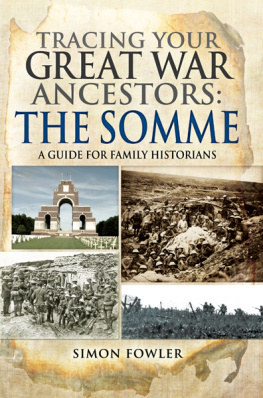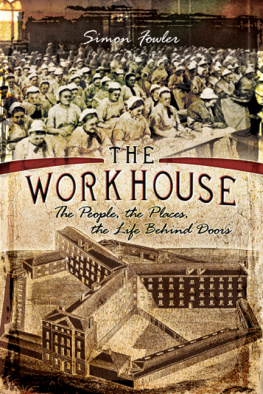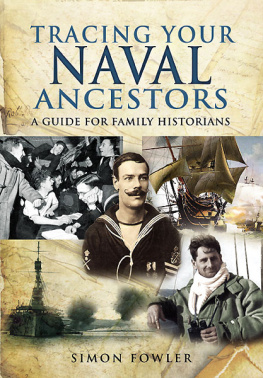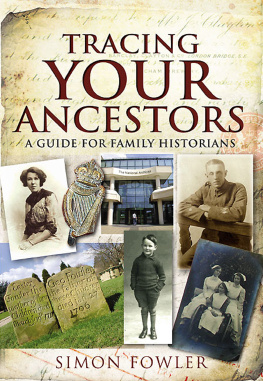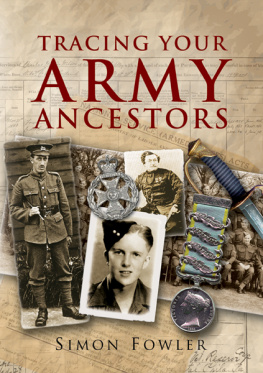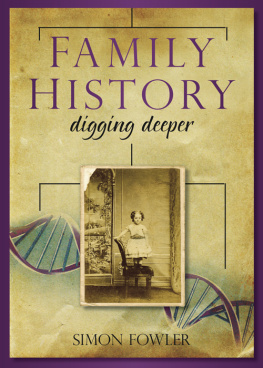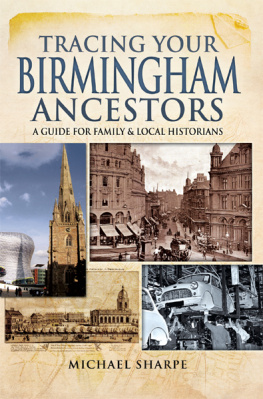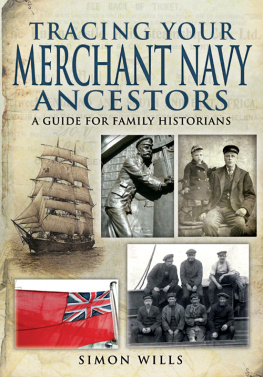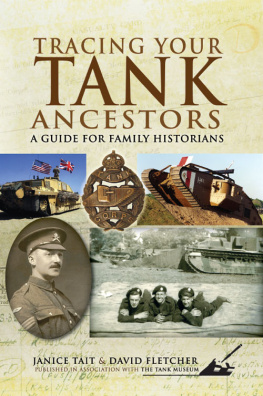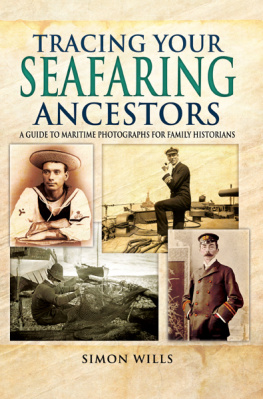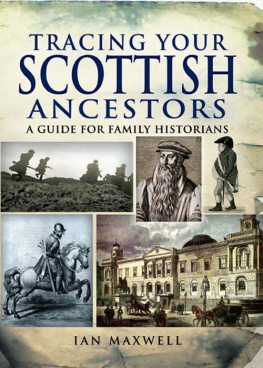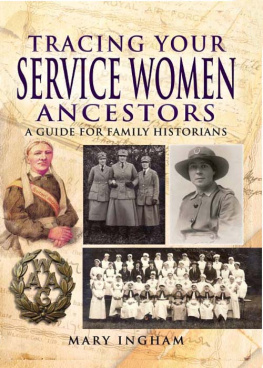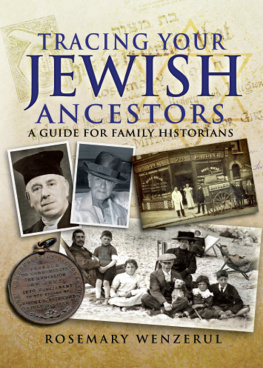FAMILY HISTORY FROM PEN & SWORD
Birth, Marriage and Death Records
David Annal and Audrey Collins
Tracing Your Channel Islands Ancestors
Marie-Louise Backhurst
Tracing Your Yorkshire Ancestors
Rachel Bellerby
Tracing Your House History
Gill Blanchard
Tracing Your Royal Marine Ancestors
Richard Brooks and Matthew Little
Tracing Your Pauper Ancestors
Robert Burlison
Tracing Your Huguenot Ancestors
Kathy Chater
Tracing Your Labour Movement Ancestors
Mark Crail
Tracing Your Army Ancestors
Simon Fowler
A Guide to Military History on the Internet
Simon Fowler
Tracing Your Northern Ancestors
Keith Gregson
Tracing Your Ancestors Through Death Records
Celia Heritage
Your Irish Ancestors
Ian Maxwell
Tracing Your Scottish Ancestors
Ian Maxwell
Tracing Your London Ancestors
Jonathan Oates
Tracing Your Tank Ancestors
Janice Tait and David Fletcher
Tracing Your Air Force Ancestors
Phil Tomaselli
Tracing Your Secret Service Ancestors
Phil Tomaselli
Tracing Your Criminal Ancestors
Stephen Wade
Tracing Your Police Ancestors
Stephen Wade
Tracing Your Jewish Ancestors
Rosemary Wenzerul
Fishing and Fishermen
Martin Wilcox
Tracing Your Canal Ancestors
Sue Wilkes
Tracing Your Lancashire Ancestors
Sue Wilkes
First published in Great Britain in 2013 by
PEN & SWORD FAMILY HISTORY
an imprint of
Pen & Sword Books Ltd
47 Church Street
Barnsley
South Yorkshire
S70 2AS
Copyright Simon Fowler 2013
ISBN 978 1 78159 037 9
eISBN 9781783376520
The right of Simon Fowler to be identified as Author of this Work has been asserted by him in accordance with the Copyright, Designs and Patents Act 1988.
A CIP catalogue record for this book is
available from the British Library.
All rights reserved. No part of this book may be reproduced or transmitted in any form or by any means, electronic or mechanical including photocopying, recording or by any information storage and retrieval system, without permission from the Publisher in writing.
Typeset in Palatino and Optima
Printed and bound in England by
CPI Group (UK) Ltd, Croydon, CR0 4YY
Pen & Sword Books Ltd incorporates the Imprints of Pen & Sword Aviation, Pen & Sword Family History, Pen & Sword Maritime, Pen & Sword Military, Pen & Sword Discovery, Wharncliffe Local History, Wharncliffe True Crime, Wharncliffe Transport, Pen & Sword Select, Pen & Sword Military Classics, Leo Cooper, The Praetorian Press, Remember When, Seaforth Publishing and Frontline Publishing
For a complete list of Pen & Sword titles please contact
PEN & SWORD BOOKS LIMITED
47 Church Street, Barnsley, South Yorkshire, S70 2AS, England
E-mail: enquiries@pen-and-sword.co.uk
Website: www.pen-and-sword.co.uk
CONTENTS
PREFACE
I started this book with the best of intentions. It was going to be a straightforward guide to researching men and women who served in whatever capacity during the First World War. I would discuss the records and show readers how to get the best from these resources and the related indexes. But somewhere along the line some of the people who were there found their way into the text. Initially I only included my family as examples, partly because I had used them before, but I soon realised three men and one woman could not represent the experiences of millions. So I added in several dozen or so men and women from each of the services and the various theatres of war. Their choice was more or less random. Some I searched for, like Florence Green ne Paterson, who when she died in February 2012 had achieved a certain notoriety as the last known person to have served in the war, while others just emerged during the research, like Company Sergeant Major Belo Akure, Nigerian Regiment.
I have tried to avoid the famous and the infamous, although there are three Victoria Cross winners. And I have tried to thread their stories or what I could discover of them into the narrative as examples of what you should be able to do with your own forebears.
Of course, each person had their own experience of the war. Some men spent months at the front, while others never left Britain let alone met a German. Some soldiers were like Sergeant James Byars, Machine Gun Corps, a pre-war regular who served in Gallipoli, Palestine and the Western Front before being demobbed in 1919 not having received, his service record suggests, a single scratch during his time in the forces. While others like Philip Forster of the Norfolk Regiment died of wounds within weeks of the outbreak of war (and to add insult to injury the authorities spelt his name wrong on his gravestone), or Staff Nurse Phyllis Pearce who was based hundreds of miles from the front but still saw the awful results of the fighting.
And this is reflected in the records. For some men there are full records, as for James Byar, while for others there is virtually nothing, just a bare entry on a medal index card, as for my Great-Uncle Stanley and Cecil Pike, of the North Devonshire Yeomanry (and even here the local newspaper managed to mess up his obituary completely), to indicate the role they played in the Great War for Civilisation. But it safe to say that if your ancestor wore uniform and went overseas then there will be a record for him or her. However, you are likely to find more for officers and men who fell for their country and for those who served during the first two or three years of the war.
One of the great changes of the war was the acceptance of women in the services, and the increasingly important role women played in the war effort as a whole, although records about women in the services are patchy, and almost non-existent for any woman who did not wear Army or Air Force khaki or Navy blue.
The interest in the First World War has grown enormously in the past thirty years or so. When I first went to the battlefields of the Western Front in the mid-1980s it was just a select few enthusiasts who could be found in the cemeteries or marching along what was once the front line to the bemusement of local farmers and cafe owners. The only records readily available were a few memoirs and the war diaries, which were largely the preserve of academics and PhD students. But as the last veterans slowly passed on so the interest in the war grew exponentially. There were television programmes (most notably Richard Holmes series of War Walks and Channel Fours The Trench ), novels (like Sebastian Fawkes Birdsong and Pat Barkers Resurrection trilogy) and non-fiction reassessments (such as Niall Fergusons The Pity of War and Gary Sheffields Forgotten Victory: The First World War: Myths and Realities ).
But above all there was the inspiring dignity of the veterans themselves, such as Harry Patch and Henry Allingham.
It was natural that genealogists, local historians and military enthusiasts should want to research the men who were there. Fortunately, by the end of the 1990s the records had largely been released, and with the arrival of commercial data providers, notably Ancestry which put much of this material online, it is now fairly simple to build up an idea of a mans service in a couple of hours. This is something that would once have taken Army clerks weeks of painstaking checking to do.
Researching a grandfathers or great-grandfathers military career is now one of the most popular genealogical research projects. It can be a particularly attractive project to undertake, because of the variety of records and advice available. In addition, it can still be an emotional subject, asking how we would have coped in the circumstances. (Badly in my case, I fear.)

